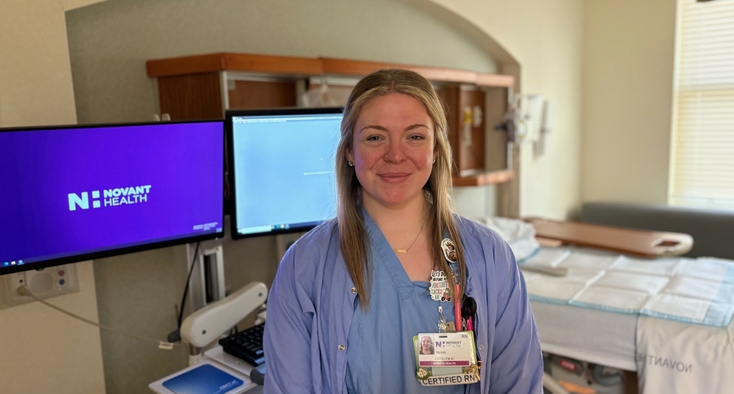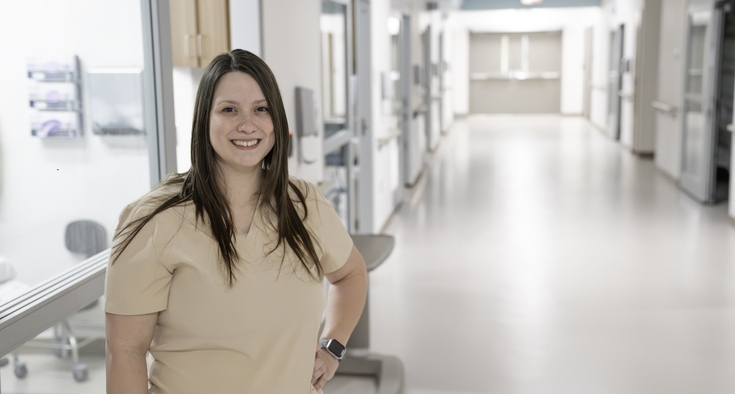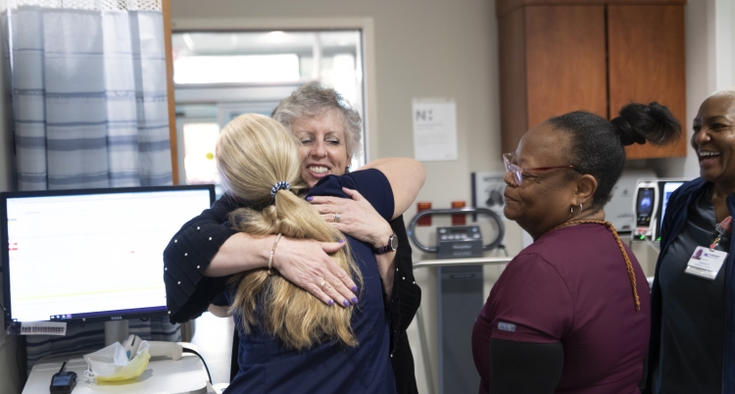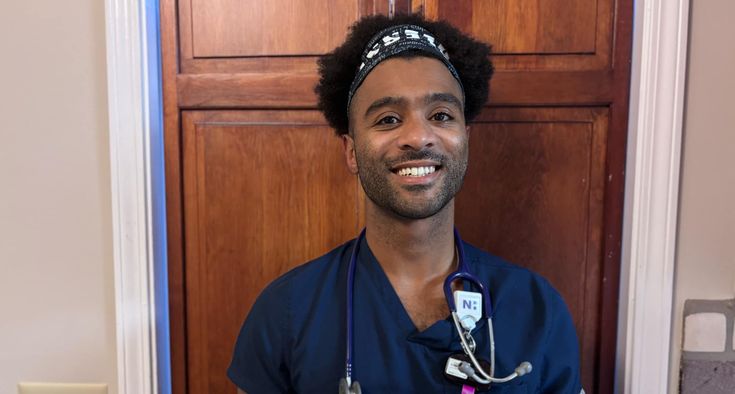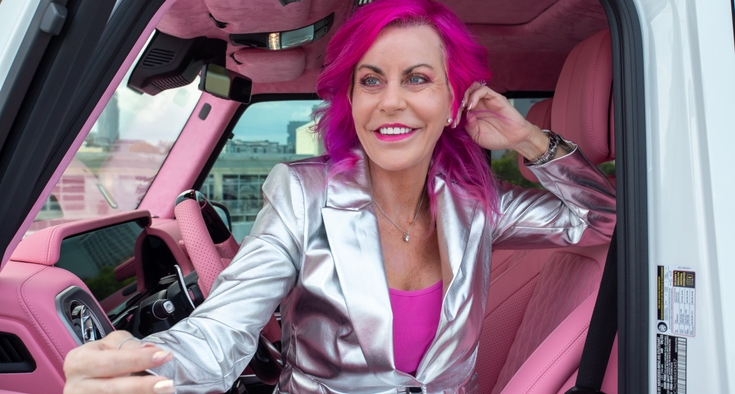When you hear the story of Novant Heath labor and delivery nurse Katelyn Eberhart’s birthing experience, you might wonder how she ever stayed in the same line of work.
The Kannapolis resident had her little girl, Ava, in October 2020 – “when the world was going crazy,” she said – at the hospital where she worked at the time. (It wasn’t a Novant Health facility.) Her pregnancy had been uneventful, but she had to be induced because of elevated blood pressure.
Then, she had an abruption – that’s when the placenta tears away from the uterus before the baby’s out – which made Ava’s heart rate drop drastically. When Ava was born, she barely had a heartbeat.
“She wasn’t breathing,” Eberhart said. “She had to be intubated, put on a cooling blanket – to preserve brain function, prevent seizures, all kinds of things.”
Ava was whisked away to the neonatal intensive care unit (NICU), and Eberhard began hemorrhaging badly. The doctor got the bleeding under control, but then Eberhart heard a pop, which turned out to be her uterus rupturing. That led to something she’d never considered: an emergency hysterectomy.
The trauma could’ve led her to a different career. Instead, she harnessed her own pain and disappointment and dedicated herself to helping new mothers – and couples – cope with difficult circumstances. Here’s how she did it – and how the experience molded her into an even more empathetic labor and delivery nurse.
Expert care for every stage of your pregnancy.
We’re both here’
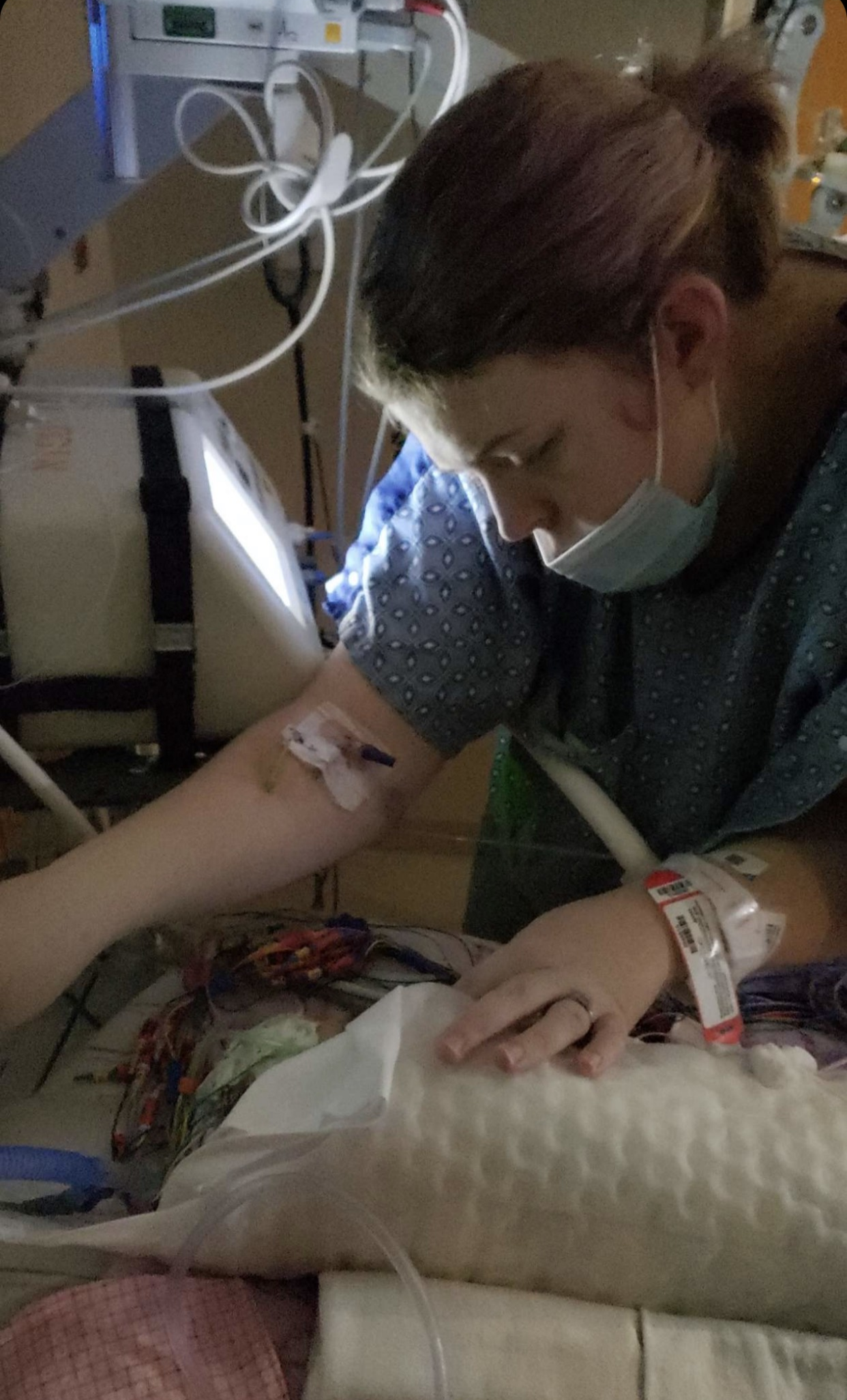
Eberhart’s daughter, Ava, was in the NICU for two weeks. “I didn’t get to hold her for five days,” she said. “When a newborn is cooling, it has to be done slowly over 72 hours. Holding your baby would warm them up, which isn’t good.
“The cooling really helped,” Eberhart said, “although she does have some brain damage. Still, she’s so smart. She’s fine. I’m fine. And we’re both here; that’s what matters.”
After maternity leave, Eberhart returned to work – although she wasn’t working at Novant Health at the time – in February 2021.
“I wanted to go back to labor,” she said, “even though people said I was insane. They offered me the chance to move to a different department. But I really wanted to be there. Still, I could not, for the longest time, go into the room where I had her. I couldn’t take care of a patient in there. I had a lot of PTSD.”
She was eventually able to go into the room and assist with deliveries. The one concession she’s made is not working on Ava’s birthday.
A purpose to the pain
Most babies are delivered with no complications.
But when someone has complications during labor at Novant Health Presbyterian Medical Center in Charlotte – where Eberhart has worked since 2023 – there’s no better advocate. She’s been there herself; she understands.
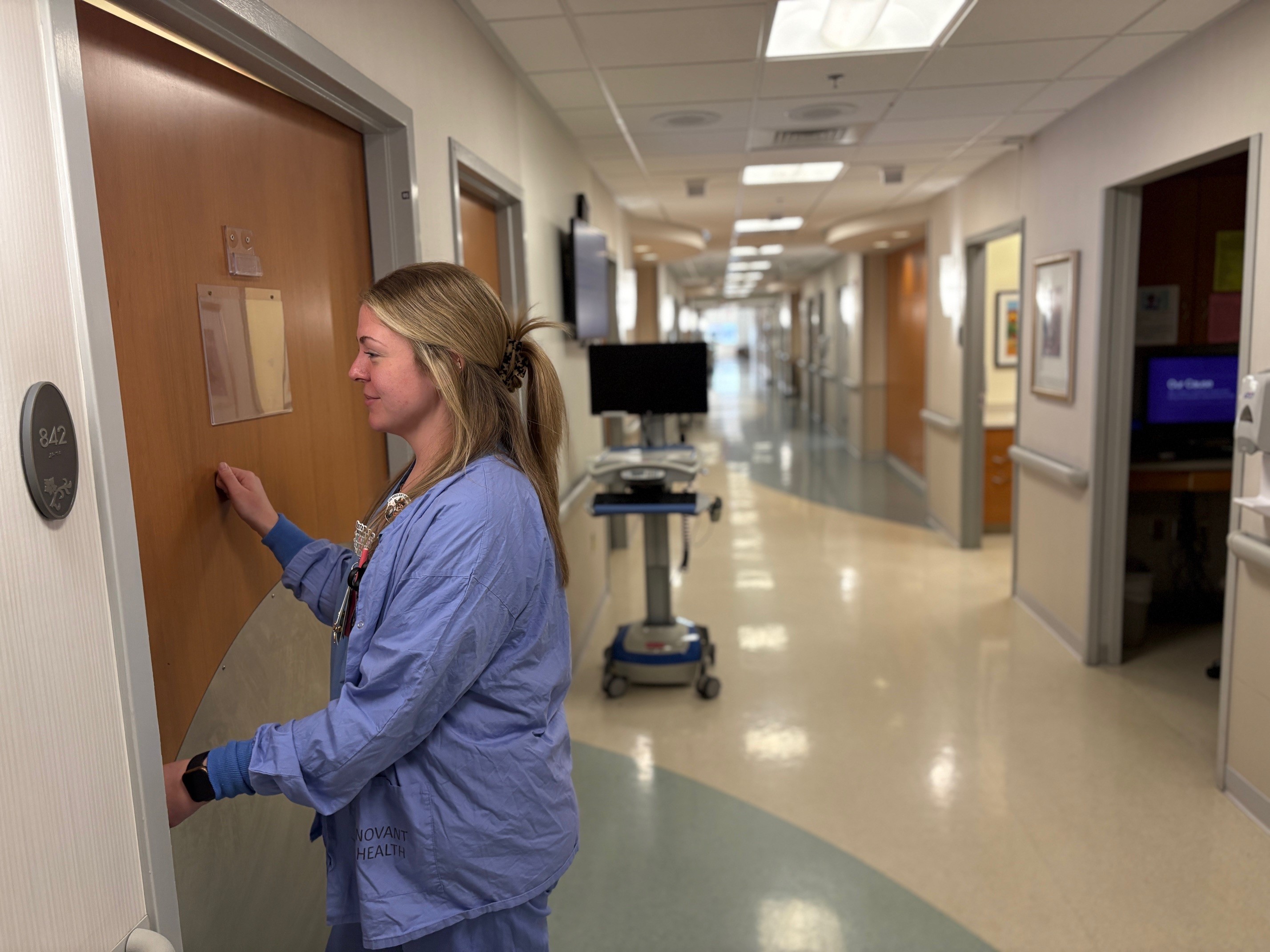
She’ll sometimes share with patients that she had her own difficult delivery, but she doesn’t go into details because “it’s kind of traumatizing for someone to hear what I went through.”
Going through her own harrowing delivery has “definitely helped me help patients through tough deliveries,” she said. It’s made her a stronger nurse. In fact, she feels there was a purpose to her pain.
“I 100% believe I went through what I did so I’d be better equipped to help people in similar circumstances,” she said. “Deliveries can go from zero to 100 in two seconds. You can be fine, and all of a sudden, not be fine.”
Helping women and couples
Since she was little, nursing is all Eberhart ever wanted to do.
She and her brother inherited a blood disorder from their mother, Eberhart said. “He and I were in the hospital a lot, as kids, for blood transfusions. When I started nursing school, I thought I wanted to go into pediatrics. But after some labor and delivery rotations, I realized I wanted to care for women during what’s one of the most exciting – and vulnerable – times in their lives.”
But it’s not just women she’s helping. Because of her own experience, she coaches new dads who’ve witnessed a traumatic delivery.

“I’ll tell couples: You need to rely on each other to get through this,” she said. “It’s traumatizing for the dad, too, because he can’t help.”
She tries to keep fathers top of mind during deliveries because she knows “it’s easy to forget about the dad since we already have two patients – the mom and the baby. We’re very focused on them.”
Her advice for couples who had a difficult delivery is to discuss their feelings and fears rather than “push those feelings to the side.” She might caution them that postpartum depression or anxiety is a possibility – and that a supportive partner is vital.
Her own labor and delivery nurse issued the same warning, which she appreciated. Especially when it happened to her. Women need to tell their doctors if everything is not OK. Experts, and women who’ve been there, agree: Don’t try to tough it out.
When she counsels new fathers on the importance of being supportive, it comes from experience. Eberhart’s husband was in the delivery room with her and was traumatized, too. The couple would struggle and eventually divorce.
Hope after trauma
Fortunately, she had great support from her mom, her OB-GYN and her friends. She and her OB-GYN are still in touch. And she said, “My friends were all there for me. Talking about my experience was more beneficial to me than anything.”
And her strong faith was, in no small part, a comfort.
When Eberhart brought Ava home in 2020, she did so with the knowledge she’d never carry another child. That came as a shock since she “never once worried (she’d) need a hysterectomy.”
Fortunately, there are other ways to have a baby. Now remarried, Eberhart and her husband have gone through in vitro fertilization (IVF) and have frozen embryos.
“We’ll need to find a surrogate,” she said, “but we’re excited that it could happen.”
One nurse marvels at the care she got from another
‘She was there every step of the way’
Katelyn Eberhart’s patients appreciate her compassion and her candor. Last May, she won a highly respected Daisy Award after being nominated by patients.
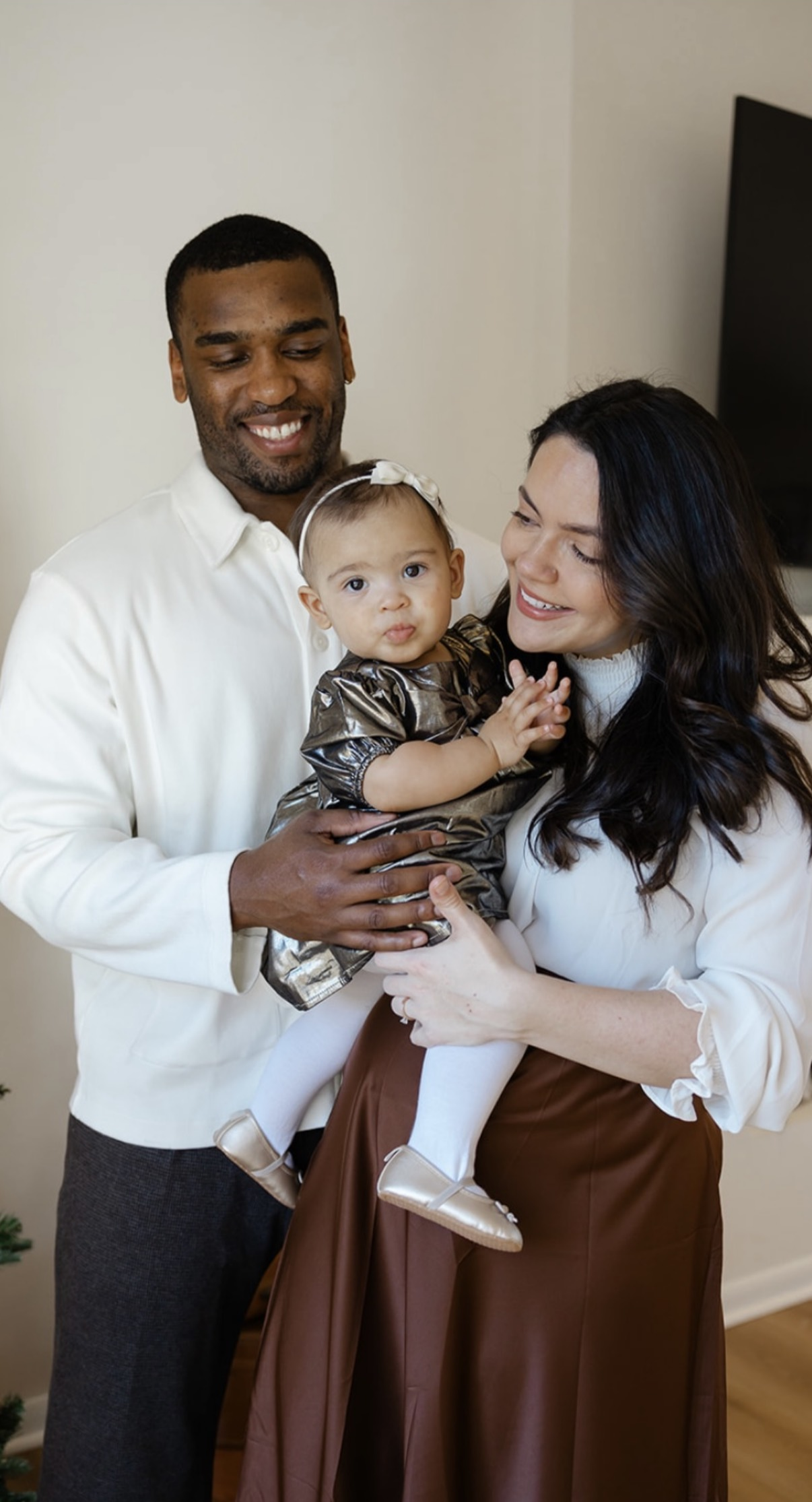
One patient who was especially grateful for Eberhart is Alexis Johnson of Charlotte – a former ER nurse who now works in healthcare administration. Like Eberhart, Johnson’s pregnancy was, she said, “about as low-risk as you can get. As a nurse, I’d seen some pretty terrible pregnancies where women were vomiting for nine months straight – or on bed rest – and I had none of that.”
Even her OB-GYN told her she’d been his “easiest patient.”
She wasn’t surprised that she needed to be induced – in January 2024 – when she was at 40 weeks and five days – since most of the women in her family have had inductions.
“After more than 30 hours of labor … our ‘low-risk’ pregnancy turned into a life-or-death delivery very quickly,” Johnson, 29 at the time, said. “Our baby’s heart rate was dropping ... suddenly there were about 30 people in our room, and I was being rushed to the OR for an emergency C-section. My husband, Dontaye, needed to gown up, so Katelyn held my hand as I sobbed. She was there every step of the way.”
Johnson echoed something Eberhart said – that being a nurse and going through a medical ordeal is both a blessing and a curse. On one hand, you understand what’s happening. And on the other, you understand all too well what’s happening. “I was scared for my child’s life and for my own life,” she said.
But the Johnsons’ baby girl, Josephine, “was perfectly healthy,” her mom said. She didn’t require a NICU stay or advanced care.
“The C-section went well,” she said, before deadpanning, “I mean, besides the fact that it was the scariest moment of our lives. What happened to me was unavoidable. Our baby was either sitting on the umbilical cord or had it in her hand. They pulled her out, and the nurses laughed, saying she looked like she was wondering: What's all this commotion about?
“Katelyn stayed close by in recovery to help us process what we just went through,” Johnson added. “She even came by after her long shift to check on us and talk to us about a difficult topic: trauma. My husband and I knew Katelyn was exhausted, and the fact that she came by after her shift – when she has her own family to take care of – moved us both to tears.”
Johnson said she and her husband like to laugh when they’re upset or scared and that “Katelyn read us perfectly” and introduced some levity into a stressful situation. “She sat with us, laughed with us, cried with us and shared some of her own birth story, and encouraged us to talk about it. She gave us the support we didn't even know we needed.”
A few weeks after Josephine was born, Johnson got COVID and mastitis at the same time and was back in the ER. Eberhart couldn’t visit her (because of COVID), but she checked on her regularly.
Johnson is expecting a sister for Josephine in late May. She’ll be back at Novant Health Presbyterian Medical Center for the delivery.





